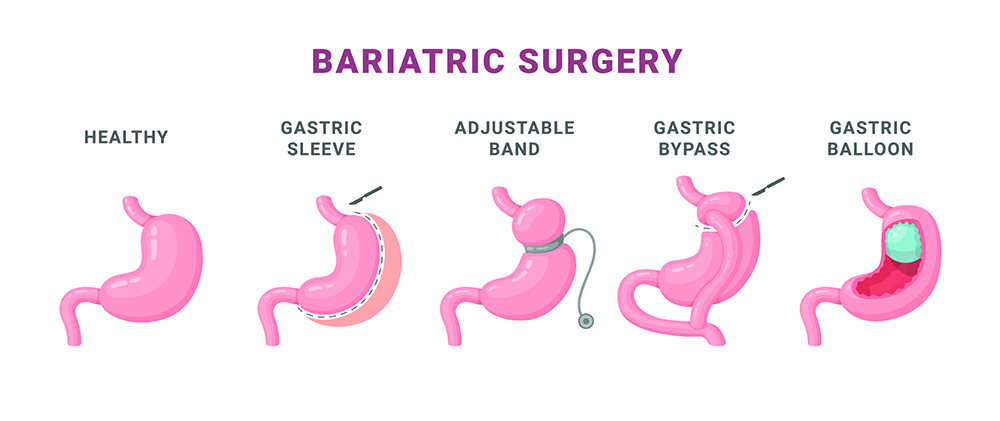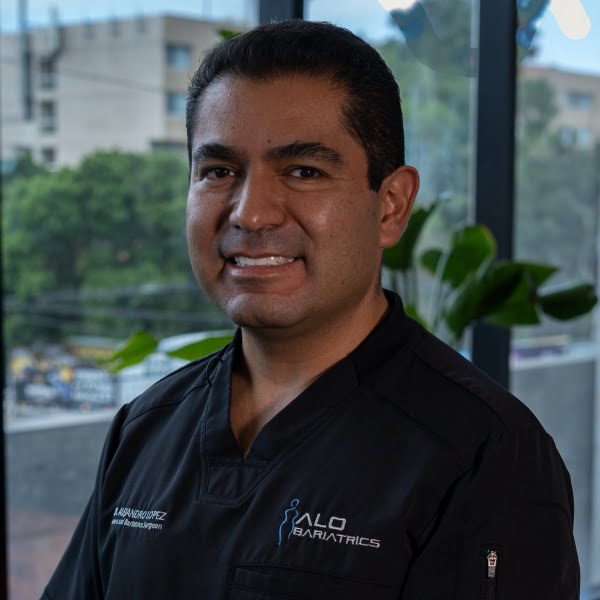What is the Safest Form of Weight Loss Surgery?
If you’ve been searching for weight loss solutions, you may have asked yourself, “Is weight loss surgery safe?” The truth is weight loss surgery is one of the safest elective procedures you can choose. Choosing the right surgeon, the right facility, and the right care team will improve the safety of any procedure. ALO Bariatrics has methodically performed decades of bariatric procedures to ensure safety and efficacy for our patients at a reasonable cost.
Read on to discover what the safest form of weight loss surgery may be right for you.
What is Weight Loss Surgery?
Weight loss surgery encompasses life-changing procedures to help people lose excess weight. While several types of weight loss (bariatric) surgery exist, some methods are more invasive than others. Each procedure generally involves modification to the stomach or small intestine to decrease the amount of food a person eats and to alter calorie absorption. Bariatric surgery is usually reserved for those who are:
- Severely overweight
- Experience health problems associated with their weight
- Minimal success at losing weight through diet and exercise
The Different Forms of Weight Loss Surgery

Bariatric surgery has come a long way, making it generally safer than it’s been in the past. Advances in surgical practice have allowed multiple types of weight loss surgery to be available to patients:
- Gastric Bypass: Gastric bypass is a classic procedure that involves creating a small pouch at the top of the stomach and rerouting the small intestine to connect to that pouch. Ask about ALO Bariatrics’ less invasive mini version of this surgery.
- Gastric Sleeve: A newer, less complicated procedure than gastric bypass is the gastric sleeve procedure. Roughly 80% of the stomach is removed, but there are no changes to the small intestine, making it less complicated.
- SADI-S: The Single Anastomosis Duodeno-Ileal Switch procedure is a modern version of the duodenal switch. A gastric sleeve procedure is done, and, in addition, the small intestine is made small and rerouted to decrease calorie absorption.
- Duodenal Switch: This is also known as the biliopancreatic diversion procedure. It, too, starts with a gastric sleeve procedure, then 2/3 of the small intestine is removed and reconnected in two places. This is considered a restrictive and malabsorptive surgical option.
- BariClip B-Clamp®: A titanium structure is placed around the stomach wall to decrease the amount of food you can eat. No part of the stomach or small intestine is removed.
ALO Bariatric surgeons are well experienced in all the procedures described. If you have additional questions about any of the procedures ALO Bariatrics offers, please contact us today.
Is Weight Loss Surgery Safe?
Any surgical procedure, including weight loss surgery, carries certain risks. Adverse reactions to anesthesia, bleeding, and infections are a few examples of complications. When considering weight loss surgery, it’s critical to thoroughly evaluate the professionals you trust with your health.
ALO Bariatrics is known for its commitment to the safety of our patients seeking weight loss solutions. As a team of experienced and qualified medical professionals, we prioritize safety in every step of the weight loss surgery process.
Whether you choose the gastric sleeve, gastric bypass, or one of our other minimally invasive surgeries, you can rest assured you are in the best hands in the business. ALO Bariatrics’ thorough approach involves detailed preoperative assessments, personalized treatment plans, and excellent postoperative care. Our attention to detail contributes to the safety of our patients during this time.
Which Weight Loss Surgery is Safest?
It depends on the individual and their needs. Some people may tolerate certain surgeries better than others. This is why your pre-surgical assessment is critical in deciding the best choice for you.
Some surgical techniques can reduce the risk of complications. ALO Bariatrics uses the laparoscopic approach to perform most of our procedures. This method allows your surgeon to access surgical areas through a tiny incision. The operation is performed with the help of cameras and thin tools to help minimize potential complications.
“When it comes to safety, gastric sleeve surgery is often recommended as the best option for weight loss surgery. The gastric sleeve is regarded as the safest procedure due to its lower risk of complications and its effectiveness in achieving significant weight loss.”
Dr. Armando Joya Munguia
Least Invasive Forms of Weight Loss Surgery?
Any time the laparoscopic approach can be used to perform a surgical procedure, there are fewer risks of complications. The SILS procedure is a less invasive form of the gastric sleeve procedure with excellent outcomes. The SILS procedure is performed through a single incision at the belly button, leaving little to no visible scarring.
When possible, a minimally invasive procedure should be your first choice of weight loss surgery, as there generally are fewer risks, decreasing the risk of complications. Call us today to speak about which weight loss surgery is right for you.
Which Weight Loss Surgery is Most Common?
The sleeve gastrectomy is the most popular surgery for weight loss at ALO Bariatrics due to the many benefits the procedure offers. Our patients can lose up to 50 percent of their excess weight within a year of surgery.
A version of the gastric sleeve procedure can also be performed through SILS. The single-incision approach offers the same great benefits as the gastric sleeve with fewer risks, making this a popular choice for those searching for a shorter recovery time.
Which Weight Loss Surgery Has the Highest Success Rate?
The success of each weight loss surgery will be different from patient to patient. Adherence to post-surgery instructions, including diet and exercise recommendations, will help make your surgery successful. With that said, the gastric sleeve and duodenal switch procedures offer patients the tools and opportunities to lose a significant amount of weight.
Make sure you’re considering the benefits and risks of each weight loss surgery you explore, and speak with a professional at ALO Bariatrics today.
Risks of Surgery vs. Obesity
If you’re on the fence about undergoing weight loss surgery, it’s important to understand the risks of surgery versus the risks of obesity.
Here are some of the risks associated with surgery:
- Infection: Postoperative infection is a risk after any surgery.
- Bleeding: Excessive bleeding can occur during or after the surgery.
- Leakage: Contents of the small intestine or stomach can leak into the abdominal cavity.
- Digestive Problems: Alterations in the stomach and small intestines can lead to digestion problems.
- Blood clots: After surgery, blood clots are more likely to develop for a short period.
While this may sound alarming, understand that complications are rare. ALO Bariatrics takes steps to ensure that possible complications of bariatric surgery are reduced by using a minimally invasive approach, laparoscopic methods, or the single-incision technique. The risks of surgery should not be a deterrent for undergoing a life-changing weight loss procedure. Staying overweight can have worse long-term outcomes than surgery, which include:
- Cardiovascular Disease: Obesity increases your risk of stroke, heart attack, and heart failure.
- Diabetes: Obesity is the primary contributor to insulin resistance and type-2 diabetes.
- High Blood Pressure: Your stroke risk is higher if you have high blood pressure from obesity.
- Cancer: Certain types of cancer risks are increased, including breast, colon, and kidney cancers.
- Liver Disease: Fatty liver disease can potentially lead to more severe liver conditions.
- Psychological Issues: Low confidence, body image issues, anxiety, or depression are just a few of the psychological complications that come with obesity.
Seek Expert Guidance at ALO Bariatrics
If you’re struggling with your weight and have been thinking about what you can do to improve your health, look no further. ALO Bariatrics is the leading expert in the field of bariatric surgery, and our procedures have never been more accessible and affordable.
To help you achieve success during your weight loss journey, speak with one of our representatives today about your options.

Dr. Alejandro Lopez, the owner and lead bariatric surgeon at ALO Bariatrics, is a Fellow at the American College of Surgeons and is accredited with the American Society for Metabolic and Bariatric Surgery. He is also a certified bariatric surgeon by the Mexican College of Surgery for Obesity and Metabolic Diseases. He is one of two surgeons in Tijuana and one out of five to ten in all of Mexico who is able to provide robotic surgery.


